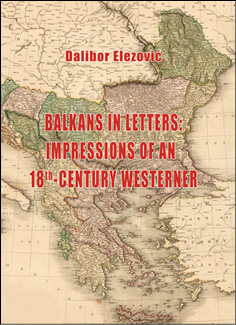
L международная выставка-презентация
научных, технических, учебно-методических и литературно-художественных изданий
Balkans in letters: the impressions of an 18th-century Westerner

| Группа | Документальная проза (нон-фикшн) |
|---|---|
| Название на русском языке | Balkans in letters: the impressions of an 18th-century Westerner |
| Авторы на русском языке | Dalibor Elezović |
Резюме
Содержание научной монографии «Балканы в письмах: впечатления француза из XVIII века» можно выразить через два основных дискурса, которые охватывают наши исследования и концепцию самой книги. Это эпистолярный дискурс, который представляет большой интерес в Новом времени. Эпистолярная форма была настолько популярна, что использовалась даже в художественной литературе: в романах, рассказах и стихах. Общеизвестно, что Новое время эпоха была периодом, когда написание писем и коммуникация писем получили наибольшее развитие. Поэтому неудивительно, что путешественник выбрал именно эту форму рассказывания историй, чтобы записать свои наблюдения и размышления во время путешествия по Балканскому полуострову. В течение этой эпохи XVIII век был эпохой, когда эпистолярная культура в целом переживала наибольший подъем. Хорошим подтверждением этого является коллекция писем, которая была предметом анализа и исследований в книге. Этот эпистолярный сборник свидетельствует о том, что письма были написаны, отправлены и ожидаются в этом возрасте; и были те, кто собирал, классифицировал и публиковал эти письма, что давало возможность будущим поколениям познакомиться как с культурой письма, так и с важными историческими фактами и атмосферой того времени. Второй дискурс гораздо более актуален для наших исследований и превалирует над панорамой на Балканах (культурные и политические обстоятельства, а также описание определенных географических областей); в письмах имеет свою выдающуюся ценность, так как это время, которого недостаточно в источниках подобного содержания заявления. В связи с этим основной вклад нашего исследования позиционируется; в первую очередь это не отражено в эпистолярном и путеводном дискурсе XVIII века и личных заботах путешественников, поскольку речь идет о важности освещения балканской истории через всестороннее описание обычаев, политических и исторических обстоятельств путешественников. Данные из письма француза представляет собой часть мозаики балканской истории XVIII века, поэтому мы считаем важным представить их научному сообществу.
Abstract
The epilogue of book Balkans in letters: the impressions of an 18th-century Westerner, could be expressed through two basic discourses that extend through our research and the very concept of the book. It is an epistolary discourse, which is very interesting during the early modern times. The epistolary form was so popular that it was used even in fiction: novels, short stories, and poems. The fact is that the early modern era was the time when letter writing and letter communication experienced the greatest development. It is therefore not surprising that the traveler has chosen exactly this form of narration to record his observations and thoughts while traveling through the Balkan Peninsula. Within the framework of this era, the 18th century was a time when the epistolary culture had the greatest rise at all. Good confirmation for this is the collection of letters, which in this book was the subject of our analysis and research. This epistolary collection testifies that people wrote, sent and waited for letters at this time; and there were also those who collected these letters, classified them, and unified them in books, giving the opportunity to future generations to get acquainted with both the culture of writing letters and the essential historical facts and the atmosphere of that era. The other discourse is much more important for our research and it prevails, and it relates to the panorama of the Balkans (cultural and political circumstances, as well as the description of certain geographical areas); which is given in letters and which has its own prominent value, given that it is a time which is deficient in sources of similar substantive testimony. In relation to this, the basic contribution of our study is positioned; which is not primarily seen in acquaintance with the epistolary and travelogue discourses of the 18th century and the personal confusion of the passenger, as much as in illuminating the Balkan region through the passenger’s detailed description of customs and political and historical circumstances. The data from the Frenchman`s letters represent a part of the mosaic of the history of the Balkans in the 18th century and therefore we consider it essential to present them to the scientific community.
